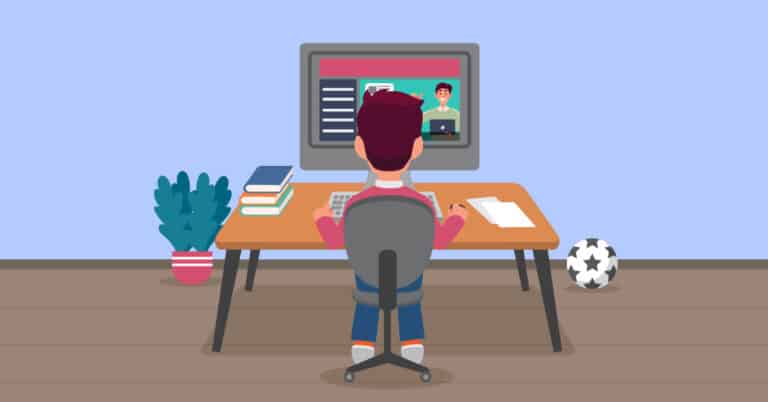The Internet is a lot like the Cave of Wonders, filled with both treasures and danger. If you know how to walk through it, you will get access to unmeasurable knowledge and connection, but if you approach it without caution, it can turn into a nightmare.
For this reason, it is every parent’s responsibility to train kids on internet safety from an early age.
While it may seem like the easiest option is to teach kids to stay away from it, this option is counterproductive. The unknown awakes curiosity which can be dangerous if not guided. Kids have internet access everywhere they go, so the best option is to teach them how to use this powerful tool safely.
20 Tips To Help Keep Your Child Safe Online
In this article, you will find 20 suggestions to help your kids stay safe online.
1. Set Up Search Restrictions

Set up search restrictions that will block sites with violent or sexual material. One way to do that is to use the SafeSearch Filters feature on Google (go to Settings/SafeSearch Filters).
There are a variety of paid tools to help you control and monitor children’s behavior online on all devices, such as Net Nanny, Canopy, Qustodio, OurPact, and others. Do the research and choose what fits both your needs and your budget.
2. Talk To Children About What They Do Online

Show interest in what your children are reading, watching, listening, or playing online. Encourage them to share what they do online with you, as they would share what’s happening in school.
“Anything interesting on TikTok?” Or, “who are your favorite Youtubers?” This is a great way to get to know them better. Kids often feel like parents are way behind to keep up with everything they do online, which is why it is necessary that you understand the social media and other platforms they use online.
This way you can help them navigate behavior online and warn them of things that they may be unaware of.
3. Educate Them On What Is Safe To Share Online

Educate kids about the risk of sharing personal information online. It is important that they are aware of how the information, images, and videos can be misused.
One of the safety check questions you can teach them to use before posting anything online, on their social media, or private conversations is “Would I share this with a stranger?” If the answer is “no” or “unsure”, advise them not to share it and consult with you.
4. Teach Children How To Keep Location Private

A lot of apps that kids will use will either ask for permission to turn geo-tagging features on or will automatically do so. It is important to teach children how to deny such permission, restrict it, or hide the information from others.
5. Keep Computers In The Area Where You Can See It
It is very important to be able to monitor children’s access to the internet, especially if they are younger. Keep the devices in areas that you share so that you can see what they are doing online.
The rule “no phones or computers” in the bedrooms and bathrooms that applies to all can help prevent arguments that start with: “Why can’t I be on the phone in my room when that is what you guys do?”
6. Agree On Family Rules Around the Internet

Agree on rules that will apply to all family members, such as when, where, and how long everyone is allowed to use the internet.
There are multiple goals to setting them up – safety online, but also more connection and quality time when you are together. For example, you can have a “no phones and computers in bedroom” or “no more than X hour(s) online” rule.
Kids easily notice the gap between what you advise them to do and what you are actually doing, and are likely to act according to what you do rather than what you say. By setting up equal rules for everyone, kids start to accept them as a “norm” on how one uses the internet.
7. Create A Contract About Media Usage
To make rules around internet consumption “official” you can create a contract for all parties to sign. Each party obliges to something and gets something in return. For example, a parent gets peace of mind and a teen gets $20 to spend on the app/game they want.
Here are three selected downloadable templates for constructing a family agreement around safe and responsible internet use.
Resource #1: childnet.com Family Agreement
Resource #2: imom.com Social Media Contract & Family Internet Contract
8. Review Content Before Your Kids Use It
Review the games, apps, websites, and other content before your kids get a chance to use them. Check whether they are age-appropriate, review privacy policy, and other relevant information that will help you decide whether it is safe for your kids to consume them.
9. Set Up Password Protection
Teach them how to set up unique passwords that can prevent anyone from accessing personal information on their devices. Help them set up passwords that aren’t guessable and use different passwords for different accounts.
It is best to have them share their passwords with you. Explain that it is important that you have access to what they store on their devices so that you can ensure their safety online.
10. Teach Children Critical Thinking

Teach children not to trust everything they read online. Encourage them to check sources and ask constructive questions, such as:
- Who created this? What is this person’s viewpoint?
- What is the message they are sending?
- Whose viewpoint is not represented? Whose voice is not heard here?
- What are the values they are promoting?
- How does this make me feel?
- How would people who are different from me feel about it?
Consume the media together and show them examples of “shocking” headlines that aim to provoke a certain type of reaction and polarize the audience. Teach them how to separate facts from interpretation.
11. Provide Safe Opportunities For Kids To Interact Online
There are plenty of wonderful communities for your kids to join online to play, learn and connect with peers, which are safe and monitored by adults. For example, Varsity Tutors offers free online courses for all grade levels, on everything from wildlife, and aliens to magic tricks.
Another free resource is Camp Wonderopolis, an “online summer-learning destination full of fun, interactive STEM and literacy-building topics”. Check out other free (and paid) opportunities to provide children with positive online experiences.
12. Create Opportunities For Kids To Connect In-person

Kids will look for entertainment and connection online when they struggle to find it offline. The more quality time they spend interacting with peers in person, the less tempted they will be to move their social life online and share it with strangers.
Help them organize time with friends, invite friends over, or take them places where they can meet friends.
13. Teach Them To Report Inappropriate Messages
Inappropriate content usually triggers a shame response in kids, which is why they hesitate to share it. This is why it is important to let them know that, no matter how awkward or embarrassing the message or image they receive or see, they should come and talk to you or another trusted adult.
Give them examples of what an inappropriate message could be and how to respond (or not respond) to it.
14. Teach Them Not To Post When They Are Upset, Sad, Or Angry
Once you click “post” or “send” it is tough to control what happens with your message. This is why you should teach kids to take their time to process emotions before they send anything to anybody that they would later regret.
Teach them to recognize emotions, get away from the screens, pause and think or talk to someone, and then if they still feel like posting or messaging someone is the right decision, go ahead with it.
15. Talk About Cyber-bullying
Teach kids how to recognize and respond to cyberbullying and also how to avoid becoming one.
Behaviors such as name-calling in private chats and online communities can often seem like a benign and even socially accepted and expected thing to do, until you realize the serious consequences it can have on someone’s mental health.
It is important not to take part in such conversations and stop them if possible. Educate them on how to recognize other behaviors that fall under cyberbullying, such as spreading false rumors, sending and receiving insulting, threatening, and explicit content.
Or sharing explicit or in other ways offending or discriminating content about others.
More information on cyberbullying HERE
16. Teach Them How To Surf Safely

Suggest you look something up online together and guide them as they are searching for information. Turn their attention to the dangers of pop-up ads and explain never to let a website install something on their device, or even scan it for viruses.
There will be websites that offer something for free for their email address. Teach them to consult with you whenever they want to do so and then use that opportunity to teach them how to read a website’s privacy policy and ensure that the website is legitimate.
17. Teach Them How To Check Their Emails Safely
The rules are very simple:
- Do not open emails from strangers (especially when they come with attachments)
- Do not open attachments before they are scanned for viruses.
- Do not respond to anybody you don’t know.
- Do not share any confidential information via email, even if it is a person you know.
Whenever in doubt, consult the adults.
18. Check Privacy Settings

Teach kids to check their privacy settings on all their social media. If they are not sure whether their accounts are private, ask them to google their names (if they are common, add district or school) and check what comes up.
Whatever is not hidden is their “digital footprint” that is easy to track by strangers.
19. Do Not Assume You Know More Than They Do
A mistake that most adults make is assuming kids know less than they do.
Instead of approaching kids as if they know nothing about the internet, try this:
“I wanted to talk to you about online safety, but the chances are you know much more than I would think you do. What are some tips or rules that you already know and follow to stay safe online?”
Praise the positive behavior first, and then suggest new behaviors.
20. Make Sure They Know That Online Isn’t All That There Is

What makes social media dangerous is the illusion that most of our lives happen there. Everything that we see online is only a partial representation of how people and events really are. There are different angles to each story.
Nobody looks or feels perfect all the time. Nobody is smiling all the time. Most people strive to create a certain image of themselves online while keeping other things private. This is an important topic to discuss with teens, whose self-image can be affected by what they see portrayed online.
Summary
The goal is not to make kids fear the internet, but to use it responsibly. To do so, it is necessary that we, as adults, do our best to keep an open mind.
Kids are going to explore the internet one way or the other, which is why we need to make sure that we keep up with their interests and learning and do our best to provide guidance and support.
While we encourage you to learn as much as you can about internet safety, please know that you do not need to know absolutely everything to prevent harm. The best tool you have as a parent is the trusting and supportive relationship you have with your kid.
When your child trusts you enough to ask challenging questions, share their insecurities and admit their mistakes, you can do your research and provide the right guidance.










